
Baccaurea ramiflora, the Burmese grape, is a slow-growing evergreen tree in the family Phyllanthaceae, growing to 25 m, with a spreading crown and thin bark. It is native to Asia, from Nepal in the west, east to southern China and south to Peninsular Malaysia. It grows in evergreen forests on a wide range of soils. The fruit is harvested and used locally, eaten as a fruit, stewed or made into wine; it is also used medicinally to treat skin diseases. The bark, roots and wood are harvested for medicinal uses.

Nepenthes sibuyanensis is a tropical pitcher plant endemic to Sibuyan Island in the Philippines, after which it is named.
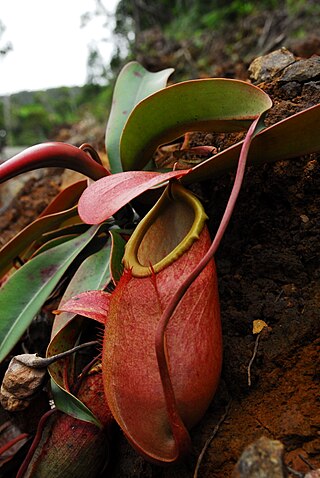
Nepenthes merrilliana is a tropical pitcher plant endemic to the Philippines. It produces some of the largest pitchers in the genus, rivalling those of N. rajah.
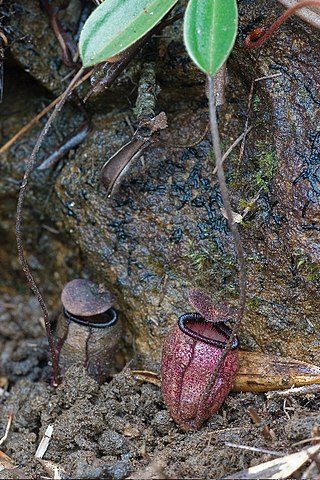
Nepenthes argentii is a highland Nepenthes pitcher plant native to Mount Guiting-Guiting on Sibuyan Island in the Philippines. It is possibly the smallest species in the genus and does not appear to have a climbing stage.

Nepenthes petiolata is a highland Nepenthes pitcher plant species endemic to Mindanao island in the Philippines, where it grows at an elevation of 1,450–1,900 metres (4,800–6,200 ft) above sea level.
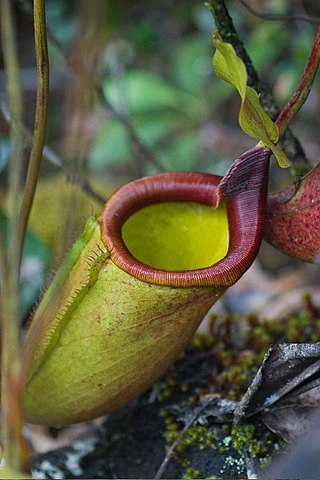
Nepenthes deaniana is a tropical pitcher plant endemic to the Philippines, where it grows at an altitude of 1180–1296 m above sea level. The species is known only from the summit region of Thumb Peak, a relatively small, ultramafic mountain in Puerto Princesa Province, Palawan.
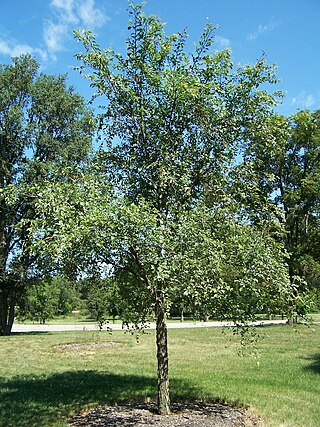
Ulmus chenmouiW. C. Cheng, commonly known as the Chenmou, or Langya Mountain elm, is a small deciduous tree from the more temperate provinces of Anhui and Jiangsu in eastern China, where it is found at elevations below 200 m on the Langya Shan and Baohua Shan mountains. The tree was unknown in the West until 1979, when seeds were sent from Beijing to the De Dorschkamp research institute at Wageningen in the Netherlands.
Elaeocarpus gigantifolius is a species of flowering plant in the Elaeocarpaceae family. It is found only in the Philippines.
Aglaia odoratissima is a species of plant in the family Meliaceae. It is found in Brunei, India, Indonesia, Malaysia, Myanmar, the Philippines, Singapore, and Thailand.
Artocarpus treculianus is a species of plant in the family Moraceae. It is endemic to the Philippines. It is threatened by habitat loss. Local names include chipuho and tipuho.
Baccaurea glabrifolia is a species of plant in the family Phyllanthaceae. It is endemic to the Philippines.
Baccaurea hookeri is a species of plant in the family Phyllanthaceae. It is found in Malaysia and Singapore.
Baccaurea latifolia is a species of plant in the family Phyllanthaceae. It is found in Malaysia and Singapore.
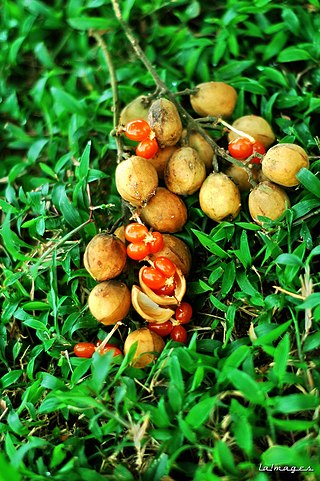
Baccaurea polyneura is a species of plant in the family Phyllanthaceae. It is native to Peninsular Malaysia, and Sumatra island of Indonesia. The fruit, called jentik, is edible, if sour, and is locally harvested and sold.
Hopea foxworthyi is an evergreen tree of the family Dipterocarpaceae. It is endemic to Sibuyan Island in the Philippines.
Kibatalia gitingensis is a species of plant in the family Apocynaceae. It is endemic to the Philippines.
Kibatalia macgregori is a species of plant in the family Apocynaceae. It is endemic to the Philippines.
Macaranga caudatifolia is a species of plant in the family Euphorbiaceae. It is endemic to the Philippines.
Frodinia gleasonii, the yuquilla, is a species of plant in the family Araliaceae. It is endemic to Puerto Rico. It is found in ultramafic soils in the central Punta range of Puerto Rico. It is a montane forest tree.

Eucommia is a genus of small trees now native to China, with a fossil record that shows a much wider distribution. The single living species, Eucommia ulmoides, is near threatened in the wild, but is widely cultivated in China for its bark, and is highly valued in herbology such as traditional Chinese medicine.









